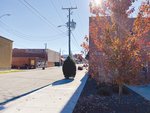

SILER CITY — Planning and Community Development Director Jack Meadows has seen the town through more economic troughs than peaks in his almost 20 years at the helm, but finally it seems that Siler City is poised for expansion and improvement — despite a global pandemic.
In 2002, upon his arrival after a stint as a planner for the city of Greenville, Meadows found a strong industry-town in Siler City. Poultry was its backbone, and between two major processing plants, it was by far the town’s biggest industry.
But as the country’s booming market slowed toward its eventual collapse and recession, Siler City buckled under the economic strain.
“We started seeing some decline and some negative things probably about 2006,” Meadows said. “I had been in for just a couple years and then we had some plants start closing.”
First went Pilgrim’s Pride, the town’s largest facility — employer to 830. A couple of years later, Townsend followed suit, and another 550 residents lost their jobs.
“I think the recession started a little earlier here than it did nationally and statewide,” Meadows said. “And then once we got into the recession, we pretty much stayed there for about a decade. I’ll be honest with you, others came out of the recession, you know, 2013 or so. But we were still in it.”
Besides its poultry plants, the town lost several other major employers as the economic slump dragged on.
“We had textiles, we had home building industry, all those things,” Meadows said. “And a lot of those things left, you know. Just a number of large industries that were in Siler City had to leave.”
But after 10 long years, the town was infused with economic potential upon the arrival of a new poultry company.
“I think it was about ’16, ’17 that Mountaire Farms announced that they were coming to Siler City,” Meadows said.
The acquisition was monumental for Siler City’s crippled economy. Mountaire, which took over Townsend’s former 265,000 square-foot facility, revitalized the town with more than 1,000 new job opportunities.
“And since then, we’ve been seeing development interest increase,” Meadows said. “We’ve seen development, you know, actually happen. And it’s across the board. There’s manufacturing growth, there’s retail growth, there’s apartment growth, there’s redevelopment downtown happening — it’s been great.”
Even following the onset of the novel coronavirus pandemic eight months ago, Siler City has largely maintained its development pace.
“We have continued to look at site plans,” Meadows said. “We just issued site plan approval for the Dr. Lane (dentistry) office the other day. Dollar General started about a month ago. The downtown redevelopment project came in at the same time. So, I didn’t see a stifling of development processes and permits during COVID at all.”
On the contrary, new project proposals come in regularly, many of which involve new or renovated housing. They include two sets of Wren Apartments both to be located downtown, the Cambridge Manufactured Home Park, Siler Square Apartments, the Hampton Village Manufactured Home Park and Tripp Cottages.
“I think our future looks bright,” said Tim Booras, owner of Siler City’s heavy industrial CAM site and a member of the town’s downtown advisory committee. “With the Wren family project as a catalyst for downtown, I think we will see more of that sort of development. Housing inventory is low and there are opportunities for more residential development. As we all know the ‘COVID reset button’ has been pushed and rural areas have become more desirable, as working from home has become of the norm.”
Even as demand increases, however, the town is determined to keep living expenses reasonable, Meadows emphasized.
“I should point out we’re looking at ways to make those developments more affordable,” he said. “And so, we’re making some changes to our regulations from time to time. And we’ve done some of that like reducing parking requirements. Maybe even making it easier to get a project approved without having to go through a board process. All the approval would be through town staff.”
But it’s not all about new development. The town is also making concerted effort to improve housing standards in existing buildings, a measure Meadows said will achieve the effect of improving Siler City’s standard of living across the board.
“Now, there is another sort of effort that we’re working on,” he said, “it’s not usually thought of because it’s not new, affordable housing. But it would be making sure folks are in a living situation that meets minimum housing standards. And so, we’ve got a minimum housing enforcement program.”
To elevate living standards in low-income housing areas around town, Meadows and his team have partnered with several Chatham organizations to secure the funding and other vital services needed to upgrade and maintain extant affordable housing facilities.
“So, I’ve got partners that have funding to help people make repairs,” Meadows said. “They have funding to help with utility assistance or rent assistance. There are some organizations who even provide labor.”
Meadows credits the town’s strong industry representation — the very thing that crippled its economy in 2008 — for keeping it afloat during the pandemic.
“You know, I’m not an economics professor,” Meadows said, “but another thing I’ve noticed that I’ve heard others talk about, like at the Chamber (of Commerce) meeting that we had a few months ago, and others have mentioned is that the entertainment industry, movie theaters, coliseums, sporting events, hotels — there’s not a strong presence of those in our city. And it seems to be in COVID, those industries didn’t do so well. But those businesses weren’t here so they couldn’t lose. So, you know, that’s something I think that’s a positive for now. But they’re also something we’d like to have.”
Booras agreed the town escaped potentially more serious repercussions.
“I think our base line was already low, so we didn’t have quite as much to lose, especially in the way of retail,” Booras said. “There are certainly businesses that were affected, but our downturn was mitigated by the level of activity that already existed. I would assume our business tax base is mostly from businesses that are deemed essential and therefore were able to be sustainable.”
Of course, Siler City is not entirely devoid of businesses from the entertainment and hospitality industries and those business owners have undergone hardship.
“Obviously, everybody’s not unscathed,” Meadows said. “There were service industries that remained closed for a time period and some retailers and others were impacted.”
As a whole, however, the town is fairing well, and Meadows has no plans to change course.
“We’re going to continue what was started before the pandemic, we’re going to continue those same things,” he said. “We’ve got good signs of economic growth and economic opportunity.”
Reporter D. Lars Dolder can be reached at dldolder@chathamnr.com and on Twitter @dldolder.